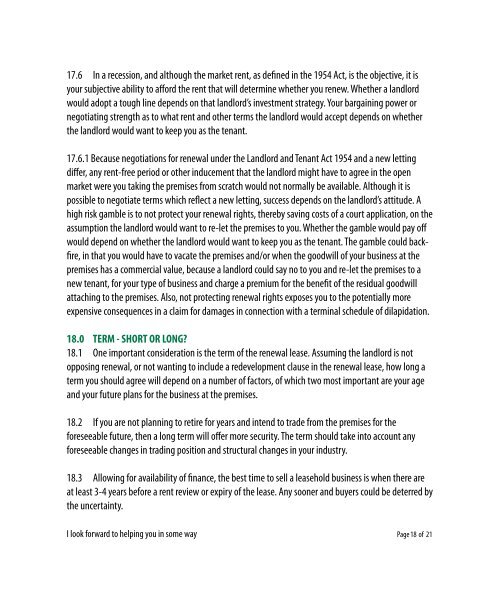ML Guide - Lease Expiry for Tenants - Michael Lever
ML Guide - Lease Expiry for Tenants - Michael Lever
ML Guide - Lease Expiry for Tenants - Michael Lever
Create successful ePaper yourself
Turn your PDF publications into a flip-book with our unique Google optimized e-Paper software.
17.6 In a recession, and although the market rent, as dened in the 1954 Act, is the objective, it is<br />
your subjective ability to aord the rent that will determine whether you renew. Whether a landlord<br />
would adopt a tough line depends on that landlord’s investment strategy. Your bargaining power or<br />
negotiating strength as to what rent and other terms the landlord would accept depends on whether<br />
the landlord would want to keep you as the tenant.<br />
17.6.1 Because negotiations <strong>for</strong> renewal under the Landlord and Tenant Act 1954 and a new letting<br />
dier, any rent-free period or other inducement that the landlord might have to agree in the open<br />
market were you taking the premises from scratch would not normally be available. Although it is<br />
possible to negotiate terms which reect a new letting, success depends on the landlord’s attitude. A<br />
high risk gamble is to not protect your renewal rights, thereby saving costs of a court application, on the<br />
assumption the landlord would want to re-let the premises to you. Whether the gamble would pay o<br />
would depend on whether the landlord would want to keep you as the tenant. The gamble could back-<br />
re, in that you would have to vacate the premises and/or when the goodwill of your business at the<br />
premises has a commercial value, because a landlord could say no to you and re-let the premises to a<br />
new tenant, <strong>for</strong> your type of business and charge a premium <strong>for</strong> the benet of the residual goodwill<br />
attaching to the premises. Also, not protecting renewal rights exposes you to the potentially more<br />
expensive consequences in a claim <strong>for</strong> damages in connection with a terminal schedule of dilapidation.<br />
2I<br />
look <strong>for</strong>ward to helping you in some way Page 18 of 21<br />
18.0 TERM - SHORT OR LONG?<br />
18.1 One important consideration is the term of the renewal lease. Assuming the landlord is not<br />
opposing renewal, or not wanting to include a redevelopment clause in the renewal lease, how long a<br />
term you should agree will depend on a number of factors, of which two most important are your age<br />
and your future plans <strong>for</strong> the business at the premises.<br />
18.2 If you are not planning to retire <strong>for</strong> years and intend to trade from the premises <strong>for</strong> the<br />
<strong>for</strong>eseeable future, then a long term will oer more security. The term should take into account any<br />
<strong>for</strong>eseeable changes in trading position and structural changes in your industry.<br />
18.3 Allowing <strong>for</strong> availability of nance, the best time to sell a leasehold business is when there are<br />
at least 3-4 years be<strong>for</strong>e a rent review or expiry of the lease. Any sooner and buyers could be deterred by<br />
the uncertainty.


